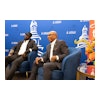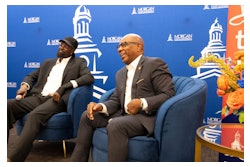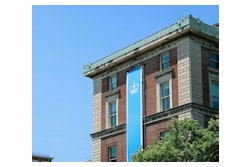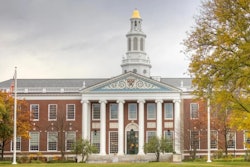PARIS — The Algerian doctoral student suspected of attacking police officers in front of Notre Dame Cathedral – with cries of “This is for Syria!” and a hammer – was identified Wednesday by a relative and a friend as an ex-journalist who firmly believed in democratic values and showed no signs of radicalization.
The Paris prosecutor’s office said a search of a residence linked to the suspect in the suburb of Cergy-Pontoise uncovered a declaration of allegiance to the Islamic State group. A nephew in Algeria, lawyer Sofiane Ikken, said he was mystified by the finding because his uncle, Farid Ikken, had previously expressed disdain for the extremist group.
“I really can’t understand it or believe it,” the nephew said in a telephone interview. “We couldn’t believe that Farid committed such an act. Everyone is calling me to say, ‘We can’t believe it. It’s not the person we knew.’”
The assault was the latest act of violence targeting security forces at high-profile sites in France, which remains under a state of emergency after a string of Islamic extremist attacks.
French government spokesman Christophe Castaner told RTL radio that police quickly classified Tuesday’s hammer attack as a “terrorist act” because of “the words he said.” The assailant yelled “This is for Syria” while trying to strike officers patrolling outside Notre Dame, Interior Minister Gerard Collomb has said.
One officer was injured slightly, police said Tuesday.
Surveillance video provided Wednesday to The Associated Press showed a man lunging at officers on the plaza outside the iconic cathedral, then being shot. The attacker remained hospitalized with gunshot wounds.
A student identity card showed he was from Algeria and 40 years old.
University of Lorraine President Pierre Mutzenhardt told France Bleu radio that the suspect was enrolled as a student at the school in eastern France, where he had been working since 2014 on a thesis about North African media.
“There’d been no difficulties with him. Nothing strange had been detected,” Mutzenhardt said.
His thesis director, Arnaud Mercier, told broadcaster BFM that the alleged attacker spoke Swedish, Arabic and French and that his resume stated he had worked as a journalist in Sweden and Algeria.
“He was someone who believed a lot in democratic ideals, the expression of free thinking, in journalism,” Mercier said on BFM. “Nothing, absolutely nothing, foretold that one day he’d be a jihadi who’d want to kill a policeman in the name of I don’t know what cause.”
Neither the university president nor the thesis adviser mentioned the suspect by name.
Algerian journalist Kamal Ouhnia, a friend who said he previously worked alongside Ikken on reporting assignments, described him as a bon vivant and a lover of fine wine.
“I don’t believe at all that he was radicalized,” he said in a phone interview. “I’m more inclined to think that he has suffered a nervous breakdown.”
The nephew said that after studying journalism in Sweden, Ikken was hired by a firm in Oslo, Norway, that sent him to Paris to work. He returned to Algeria in 2011, opening a PR agency, establishing an online newsletter and working as a journalist, before moving back to France for doctoral studies.
Ikken’s family is not religious, according to the nephew. When they last spoke three weeks ago, the nephew said he sensed his uncle was feeling “a little bit alone.” He said they discussed Syria in the past and that Ikken was “sensitive about the massacres” there, but gave no indications of having been radicalized.
The attack came as newly elected French President Emmanuel Macron is making good on a campaign promise to beef up counterterrorism efforts by creating a new unit to improve intelligence-sharing.
It will be based at the presidential Elysee palace, operate 24 hours a day and act directly under the president’s authority. The unit will focus on French citizens who joined the Islamic State group in Syria and Iraq.
The presidency says the counterterrorism unit also will identify strategies to counter propaganda aimed at promoting radicalization and instructions for carrying out attacks.
Aomar Ouali in Algiers, Algeria, and Lori Hinnant, Elaine Ganley and Sylvie Corbet in Paris contributed. The story has been corrected to remove reference to the attacker being shot to death.



















